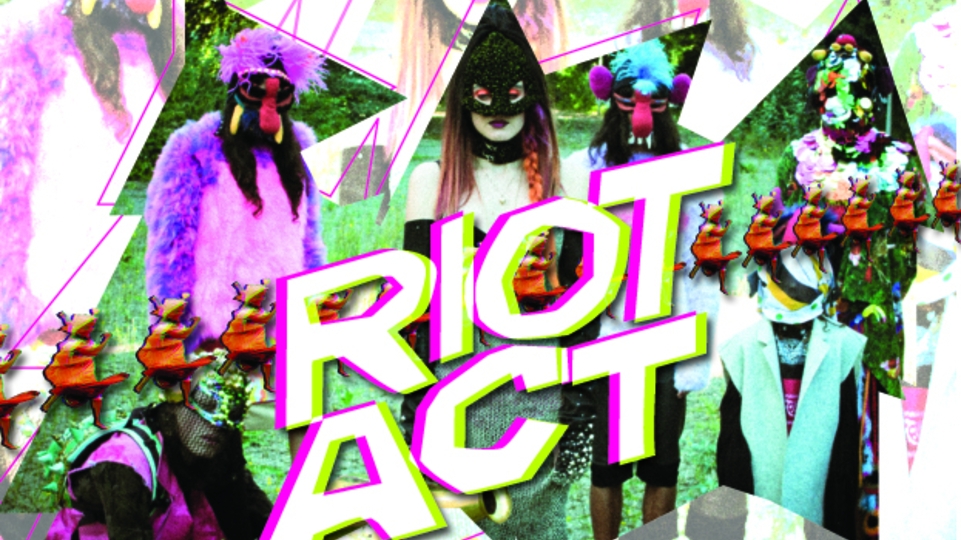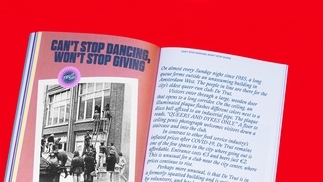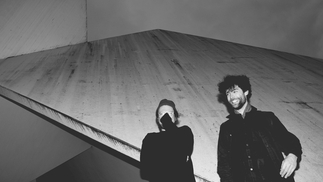RIOT ACT: SKIP & DIE
DJ Mag join frontwoman Cata Pirata and the band in Amsterdam to find out what exactly spurs their voyages across the atlas...

From their Amsterdam base, Skip & Die roam the world looking for fresh sounds to inject into their raucous global bass 'n' beats. And with their debut album 'Riots In The Jungle', they're not afraid of stirring a little insurrection. DJ Mag join frontwoman Cata Pirata and the band in their home city to find out what exactly spurs their voyages across the atlas...
“I feel like I’m in a bubble here,” says Cata Pirata. And feeling like we’re floating above the city as we contemplate the Amsterdam skyline stretching out to the North Sea, DJ Mag can see what she means. We’re seven stories up in a room in an old newspaper office, although the building’s drab grey exterior would give no clue to what we find inside.
For it’s here that Jori Collignon, Cata’s musical partner in Skip & Die, has set up his studio, a room brimming with vintage synths, broken down pianos and esoteric instruments the pair have picked up around the world. Meanwhile in the corner, a group of African lovebirds twitter away sweetly in a cage, their plumage as colourful as Cata’s own orange and pink streaked barnet.
Yet, just like those lovebirds, Cata seems a bit restless. Walking through the streets with the rest of the Skip & Die live band in the early Autumn sunshine a little later, pointing out her favourite haunts, like the bars around Nieuwmarket or the former brothel that now serves as the studios for Amsterdam’s Red Light Radio station — and which still needs a sign saying NO SEX in the window — it’s clear that Cata adores the city she’s called home for the past few years.
But whilst she “loves the fact that I can just get on my bike and ride anywhere”, she also “doesn’t want to stay here too much because it sometimes feels too safe. I need to feel a certain edge to inspire me, so I need to get out and see the world”.
SOUTH AFRICAN ROOTS
Having spent time in the Azores, Ibiza and the UK, Cata has seen more of the world than many. But it was to her birthplace in South Africa that she and Jori, after meeting in Amsterdam, returned to record the sessions that would eventually become Skip & Die’s debut album ‘Riots In The Jungle’.
“I made this plan that we should go back to South Africa and see what the musical environment is like nowadays,” Cata explains. “I need some kind of conflict to be able to create and in South Africa there’s constant conflict. There’s a constant uneasiness and unsettledness, and there’s so many different cultures living next to each other. A lot of the time they don’t mix, but when they do, it’s so interesting. We wanted to go on an adventure to hone and elaborate on our own skills, but connect with other people on the way.”
It was an adventure that took them from the sprawling urban jungle of Johannesburg and its surrounding townships, through humid rainforests, towering mountains and dusty deserts before ending up in Cape Town on the breezy Atlantic coast, witnessing punk bands playing in the streets and illegal car races in shanty towns along the way. During which travels Skip & Die met an exotic cast of musical characters, such as marimba bands, kwaito rappers and electronic club kids, all of whom appear throughout ‘Riots In The Jungle’s kaleidoscopic carnival.
“I looked at a few bands on MySpace before we went and hit up a few I thought we could make a connection with,” Cata reveals. “But once we got to South Africa, we started meeting other people. We collaborated with this South African band called Gazelle and they said, ‘Guys — there’s this amazing marimba band — you should go and check them out’. So we went to their house and got the marimbas out and started jamming together and they’re very prominent on the album.
That was amazing — there were about 20 of us in this tiny shack with these big marimbas, and it was a really cool process. When you start making music with someone, you start connecting with them on a whole new level, and I love the fact that South Africa’s so diverse. It’s a place of real extremes.”

GLOBAL PIRATE AIRWAVES
As is ‘Riots In The Jungle’ itself. The original recordings might have been made in South Africa but, after Jori and Cata had pieced them back together in Amsterdam, the result sounds like a truly global trip.
You can feel the African heat in ‘Thina Sobani’s skittering percussion, but ‘Love Jihad’ begins as klezmer jazz suddenly interrupted by shuddering bass — as if Schlatofbronx had invaded a cellar bar in Krakow. Indian sitars swirl throughout ‘Senorita’, ‘Anti-Capitalisto’ sounds like a Latin lament carried in from the Caribbean, and they even seem to stop by in South London to pick up the heavyweight dubstep basslines of ‘La Cumbia Dictadura’.
It’s like a radio dial spinning through the global pirate airwaves, the only links being Cata’s voice — alternately feline and fiery — and the passion that seems to seep from every track.
“We love all those different styles because they’re like the people’s party music,” she enthuses. “Kwaito, cumbia, baile funk — all these beats that have been created in places where people just want to have fun, but where it runs along [with] some kind of struggle. We’re connecting the struggle with the party.”
Not that Skip & Die set out to stand on a soapbox, although Cata is aware that anything made in South Africa will be considered political “just because the country’s history is so heavy”.
“I don’t intend to be political but I come from a background where we were constantly debating our place in the world and the bigger picture,” she says. “So it’s hard for me not to be political, but I try to balance the personal with the political, because I make music as a vent and a way of expressing what I see in the world.”
Indeed, if the wild mood swings reflect anything, it’s as much what’s going on inside Cata’s own head as tumultuous times in the outside world. “My entire being is a collage of everything I experience and it sometimes feels like too much!” she laughs. “But that’s the way we both are. Jori has a background in the cut 'n’ paste aesthetic of hip-hop, so he’s also used to putting stuff together like a puzzle and that’s the way we love working.
It’s not one straight linear story — it’s a jumble of different energies and styles. So the baile beats aren’t straight-up baile beats, and the cumbia isn’t a tribute to cumbia — we’re not trying to say that this is what this music should sound like — it’s us recreating what we feel like from our experiences of it. I can understand that it might come across as just like this mix of stuff, but for us, it just seems completely natural.”

NOT WORLD MUSIC
Cata’s also wary of referring to Skip & Die as ‘world music’, “because that’s a very Western term where everything else is just put into one box”. She does agree, however, that for a generation of clubbers used to hearing DJs such as Diplo and Sinden dropping baile funk and reggaeton in their sets, perceptions of ‘world music’ are now vastly different from just “folk music from some little village in Africa”, and that for artists like MIA and Buruka Som Sistema, the act of breaking down cultural barriers by mixing together beats from across the globe is almost as much of a political statement as their lyrics.
“They’re bands that people understand and that I relate to,” she states. “It’s about showing people a lot more than they’re maybe used to, especially given the way the music industry is going on the negative side of the scale. Everything’s becoming so commercial and they’re just making dumb pop songs to sell records, but I’m really happy that stuff that has a bit more weight to it and tries to get out of a certain box is starting to break through as well.”
And if Skip & Die do want to speak to the world, it’s only right that they do so in as many tongues as musical styles. Fluent in six different languages — English, Dutch, Portuguese, Spanish, French and Afrikaans — Cata sings in most of them at various points throughout the album, whilst the South African artists, such as Driemanskap, also add snatches of Xhosa and Zulu to their tracks.
DJ Mag’s monolingual English ears mean we can’t make sense of most of them — although you hardly need a Spanish dictionary to translate the sentiments of ‘Anti-Capitalista’ from its title — but in the parts we can pick up, we hear ‘Delhi Dungeon’, with lyrics as sleazy as the Red Light District on the other side of Amsterdam, whilst ‘Riots In The Jungle’s tale of “worker ants refusing to save this false economy” could almost be The Jungle Book rewritten by Billy Bragg.
“My lyrics usually come from a mix of personal situations and things I see in the news,” she elaborates. “But I also love fairytales and things like Rudyard Kipling’s ‘Just So’ stories, which stem from a certain kind of African mysticism and where animals are metaphors for life and the human condition.”
Although those metaphors have been somewhat lost on some of the people who’ve heard the title of lead single ‘Love Jihad’, it seems.
“It’s complete bullshit that some people have said, ‘She loves jihad! Is she going to bomb something?’” Cata rails. “And then some guy who I think must be fairly extremist has written comments like ‘How dare you bastards use the word jihad! You’re insulting my culture!’ on the internet. But I borrowed the term ‘love jihad’ from India, where young Muslim boys seduce girls and then try and convert them to Islam. So it’s really a song of emancipation about resisting anyone with false intentions who is trying to manipulate you. That could also be a girlfriend manipulating her boyfriend or a corporation trying to manipulate the people — it has nothing to do with any one religion, sex or culture.”
MEANING OF THE NAME
However, with the video for ‘Love Jihad’ now playlisted on MTV, Skip & Die’s message is soon to be spreading much further afield than the Netherlands, where the band have built up a staunch following on the festival circuit. There’s undoubtedly a certain irony in the fact that a group so global in sound have only really performed in a small corner of Northern Europe thus far, although it has given them the training ground to hone a live show that’s as much a force of nature as their forewoman.
Starting out as just Jori and Cata, Skip & Die live has now blossomed to become a five-piece recruited from their friends around Amsterdam; with Gino Bombrini and Nique Quentin battering out percussive salvoes, Daniel Rose switching between guitars and sitars and Rene Kuhlmann unleashing the electronics whilst Cata stalks the stage. Notable by his absence however is Jori, who although still shaping Skip & Die’s sound in the studio, has stepped back from his live duties to concentrate on playing with his glitch electro house outfit Nobody Beats The Drum, with whom he is touring the US when we arrive in Amsterdam.
“I started off standing in for Jori when he couldn’t make the gigs,” explains his live replacement Rene. “But we realised that it was better for the rest of the band if they weren’t playing with a different person every night.”
Does this mean that, without one of their two founders onstage, Skip & Die live is now either Skip or Die though? After all, we ask Cata, which of the two of you is which?
“The name is more about how we see life,” she explains. “The way you’ve got to have the light and the dark and the positive and the negative. So ‘Skip’ is all about jumping happily through life, but then you could suddenly Die as well. It made sense when there was just two of us, but which one we are depends on our mood that day. Although when we were first starting out, Jori did want to call us ‘Cheap Flights'!’’
Whatever the name, Skip & Die are ready for take off.





